Field and widget can render bootstrap dialog window with content from django view
Project description
django-popup-view-field



Field and widget can render bootstrap dialog with content from django view. You can create normal django View and load this view in dialog for form field.
Support:
Python: 2.7, 3.4
Django: 1.8, 1.9, 1.10
django-crispy-forms
django-bootstrap3
Require:
Django
bootstrap3
JQuery
Recommended:
django-bootstrap3 or
django-crispy-forms
Locale:
EN - (english)
PL - (polish)
Tested on browsers:
OK - Firefox 50.1.0 - Ubuntu 14.04
OK - Firefox 31.1 - CentOS 6.4
OK - Chromium 53.0 - Ubuntu 14.04
OK - Microsoft Edge 38 - Windows 10
OK - Internet Explorer 11.0 - Windows 10
OK - Internet Explorer 10.0 - Windows 7
OK - Internet Explorer 9.0 - Windows 7
ER - Internet Explorer <= 8 (no support “html()” for data-popup-view-value)
Screenshots
Example: Form with several popup-view-fieds
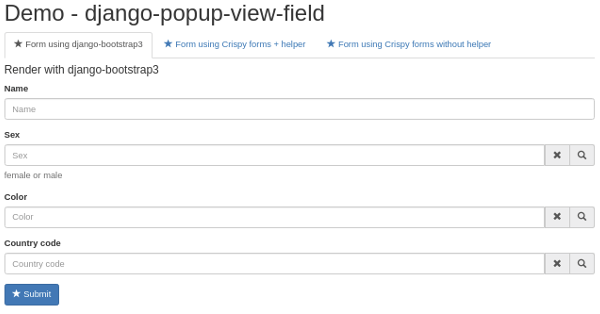
Example: Dialog for select sex
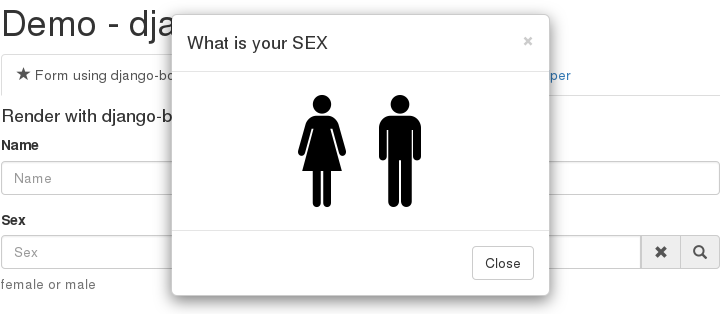
Example: Dialog for select color
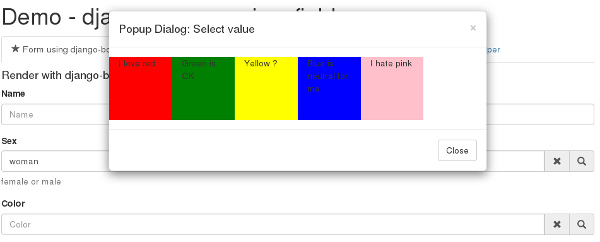
Example: Dialog with form
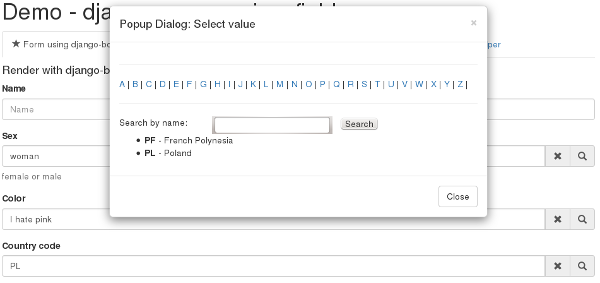
Run demo
Clone or download repository:
git clone https://github.com/djk2/django-popup-view-field.git
Create virtualenv or not (red more: http://docs.python-guide.org/en/latest/dev/virtualenvs/)
Install requirements for demo:
cd django-popup-view-field/demo pip install -r requirements.txt
Run developing web server:
python manage.py runserver
Run your browser and call url: 127.0.0.1:8000
firefox 127.0.0.1:8000
Install
Install package - There are several solutions, choose your own
Install using pypi repository:
pip install django-popup-view-field
Install using pip + github repository url:
pip install git+https://github.com/djk2/django-popup-view-field.git
Install using pip + zip archive:
wget https://github.com/djk2/django-popup-view-field/archive/master.zip pip install master.zip
Clone or download application to your django project directory:
wget https://github.com/djk2/django-popup-view-field/archive/master.zip -O /tmp/master.zip unzip /tmp/master.zip -d /tmp/ cd my_project_dir cp -r /tmp/django-popup-view-field-master/django_popup_view_field/ ./
Add django_popup_view_field to your INSTALLED_APPS setting
settings.py
INSTALLED_APPS = [
...
'bootstrap3', # If you use django-bootstrap3
'crispy_forms', # If you user django-crispy-forms
'django_popup_view_field',
...
]
- Warning:
Is recommended use django-bootstrap3 or django-crispy-forms to render forms and fields, but this is not necessary. You can still write django templates using pure CSS from bootstrap3. More information about bootstrap forms in here: http://getbootstrap.com/css/#forms
Add the django_popup_view_field urls to your root url patterns
urls.py
urlpatterns = [
...
url(
r'^django_popup_view_field/',
include('django_popup_view_field.urls', namespace="django_popup_view_field")
),
]
- Note:
The URL path can be whatever you want, but you must include ‘django_popup_view_field.urls’ with the ‘django_popup_view_field’ namespace. You may leave out the namespace in Django >= 1.9
In your base template, add django_popup_view_field_javascript tag
django_popup_view_field_javascript template tag load all required javascripts and template-scripst for application. Tag should be append before body close </body> tag and after jQuery and Bootstrap scripts.
base.html
<!DOCTYPE html>
{% load django_popup_view_field_tags %}
<html>
<head>
...
<!-- Bootstrap CSS should be here -->
...
</head>
<body>
...
...
<!-- jQuery script should be here -->
<!-- Bootstrap javascripts should be here -->
...
...
{% django_popup_view_field_javascript %}
</body>
</html>
Simple Example
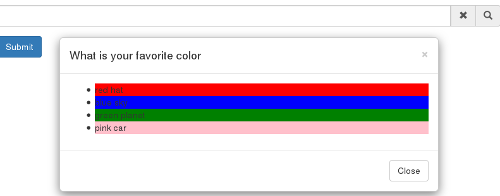
Create PopupView
Html content rendered by this view will be loaded into bootstrap dialog. Create your popup view same as normal django view.
templates/myapp/popups/colors.html
<ul>
<li data-popup-view-value="red" style="background:red;"> red hat </li>
<li data-popup-view-value="blue" style="background:blue;"> blue sky </li>
<li data-popup-view-value="green" style="background:green;"> green planet </li>
<li data-popup-view-value="pink" style="background:pink;"> pink car </li>
</ul>
If user click on the element with the attribute data-popup-view-value, the value of this attribute will be set in form field and dialog will close.
If you want set content of element as value in form field, use html() for attribute:
<li data-popup-view-value="html()"> This text will be use :) </li>
popups.py
from django.views.generic import TemplateView
from django_popup_view_field.registry import registry_popup_view
class ColorsPopupView(TemplateView):
template_name = 'myapp/popups/colors.html'
# REGISTER IS IMPORTANT
registry_popup_view.register(ColorsPopupView)
Remember that you must register your popup view. After register you can run your popup view by call url:
..../django_popup_view_field/ColorsPopupView
In template you can get url to popup view using url tag:
{% url "django_popup_view_field:get_popup_view" 'ColorsPopupView' %}
After register you can unregister your popup view:
registry_popup_view.unregister(ColorsPopupView)
# or unregister by view name
registry_popup_view.unregister_by_name('ColorsPopupView')
You can also get popup view class by name:
view_class = registry_popup_view.get('ColorsPopupView')
view_class.as_view()
Create Form with PopupViewField
forms.py
from django import forms
from django_popup_view_field.fields import PopupViewField
from myapp.popups import ColorsPopupView
class ColorForm(forms.Form):
color = PopupViewField(
view_class=ColorsPopupView,
popup_dialog_title='What is your favorite color',
required=True,
help_text='be honest'
)
class PopupViewField(view_class, popup_dialog_title, *args, **kwargs)
view_class - required - popup view class, view to render dialog content, must be subclass of django.views.generic.View
popup_dialog_title - not required - Title for dialog, default Popup Dialog: Select value
args and kwargs are default for CharField
Create typical FormView
views.py
from django.views.generic import FormView
from myapp.forms import ColorForm
from django.http import HttpResponse
class ColorFormView(FormView):
template_name = "myapp/color_form.html"
form_class = ColorForm
def form_valid(self, form):
color = form.cleaned_data.get("color")
return HttpResponse("Your color: {0}".format(color))
Template using django-crispy-forms
templates/myapp/color_form.html
{% extends "base.html" %}
{% load crispy_forms_tags %}
{% crispy form %}
Template using django-bootstrap3
templates/myapp/color_form.html
{% extends "base.html" %}
{% load bootstrap3 %}
<form action="." method="post" class="form">
{% csrf_token %}
{% bootstrap_form form %}
{% buttons %}
<button type="submit" class="btn btn-primary">Submit</button>
{% endbuttons %}
</form>
Template with pure bootstrap3 css (without django-bootstrap3 and crispy)
templates/myapp/color_form.html
{% extends "base.html" %}
<form action="." method="post" class="form">
<div class="form-group">
<label class="control-label"> {{ form.color.label }} </label>
{{ form.color }}
</div>
<button type="submit" class="btn btn-primary">Submit</button>
</form>
Advanced Example
Advanced Example use django-bootstrap3. Dialog is interactive, all links and forms will be send via Ajax and response will be loaded in dialog.
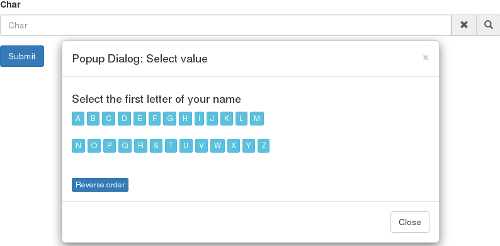
PopupView
templates/myapp/popups/alphabet.html
<h4> Select the first letter of your name </h4>
{% for char in alphabet %}
<div class="btn btn-xs btn-info" data-popup-view-value="html()">
{{ char }}
</div>
{% if forloop.counter|divisibleby:"13" and forloop.counter > 0 %}
<br/><br/>
{% endif %}
{% endfor %}
{# Button to change order #}
<a class="btn btn-xs btn-primary" style="margin-top:20px;"
href="{% url "django_popup_view_field:get_popup_view" 'AlphabetPopupView' %}?direction={{direction}}">
Reverse order
</a>
popups.py
from django.views.generic import TemplateView
from django_popup_view_field.registry import registry_popup_view
from string import ascii_uppercase
class AlphabetPopupView(TemplateView):
template_name = 'myapp/popups/alphabet.html'
direction = 1
def get_context_data(self, **kwargs):
self.direction = int(self.request.GET.get("direction") or self.direction)
alphabet = ascii_uppercase[::self.direction]
ctx = super(AlphabetPopupView, self).get_context_data(**kwargs)
ctx['alphabet'] = alphabet
ctx['direction'] = self.direction * -1
return ctx
# REGISTER IS IMPORTANT
registry_popup_view.register(AlphabetPopupView)
Form with PopupViewField
forms.py
from django import forms
from django_popup_view_field.fields import PopupViewField
from myapp.popups import AlphabetPopupView
class AlphabetForm(forms.Form):
char = PopupViewField(view_class=AlphabetPopupView, required=True)
View
templates/myapp/alphabet.html
{% extends "base.html" %}
{% load bootstrap3 %}
<form action="." method="post" class="form">
{% csrf_token %}
{% bootstrap_form form %}
{% buttons %}
<button type="submit" class="btn btn-primary">Submit</button>
{% endbuttons %}
</form>
views.py
from django.views.generic import FormView
from myapp.forms import AlphabetForm
from django.http import HttpResponse
class AlphabetFormView(FormView):
template_name = "myapp/alphabet.html"
form_class = AlphabetForm
def form_valid(self, form):
char = form.cleande_data.get("char")
return HttpResponse("First letter of your name : {0}".format(char))
Others
Remember, if you use a django-crispy-forms then you should set CRISPY_TEMPLATE_PACK = “bootstrap3” in settings.py
If you want change locale (Polish, English is supported) then you must add LocaleMiddleware to your settings.MIDDLEWARE:
MIDDLEWARE = [ 'django.contrib.sessions.middleware.SessionMiddleware', ... 'django.middleware.locale.LocaleMiddleware', ]More about bootstrap in here : http://getbootstrap.com/
More about django-crispy-forms in here : http://django-crispy-forms.readthedocs.io/en/latest/
More about django-bootstrap3 in here : http://django-bootstrap3.readthedocs.io/en/latest/
Documentation prepared with the help of Online reStructuredText editor : http://rst.ninjs.org/
Project details
Download files
Download the file for your platform. If you're not sure which to choose, learn more about installing packages.
Source Distribution
Built Distribution
Hashes for django-popup-view-field-0.3.0.tar.gz
| Algorithm | Hash digest | |
|---|---|---|
| SHA256 | 505956143cd8afd62aa9d862eff3b435205f502cb4eea189155d1f45084c8d35 |
|
| MD5 | 4b26017b8a5d492ec54a12582756b59b |
|
| BLAKE2b-256 | 4675fb98c8380cc15c0e380047e5958cc78dad4f1dea99be12cf0b2952f00b0b |
Hashes for django_popup_view_field-0.3.0-py2.py3-none-any.whl
| Algorithm | Hash digest | |
|---|---|---|
| SHA256 | 2fb05b12fe3551e6b04474957cc9a773cbc112d8e2474a070642478cbd47d870 |
|
| MD5 | c0fa2cbede1a77d86d76bafc80df7649 |
|
| BLAKE2b-256 | 438e19701d60914cfa3e4b29cf916a54c1bf7d9fbab12068a2f8c2568d45b2d0 |











